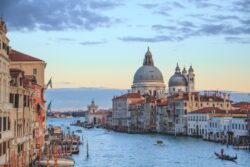Could global warming actually save Venice? (Credit: Unsplash)
Venice could be saved by global warming, according to new research.
The most romantic city in Europe is facing the same fate as legendary Atlantis – by disappearing beneath the waves.
But rising temperatures are changing atmospheric and current circulation patterns in the Mediterranean. They are fuelling a ‘cold oscillation phase’ – a weather phenomenon that actually reduces the risk of flooding.
Lead author Professor Davide Zanchettin, of Ca’ Foscari University of Venice, said: ‘If it occurs, then our calculations indicate between now and 2035, the sea level in Venice may level off.’
The marine maze, full of tiny footpaths and tucked away squares, hidden museums and secluded, centuries-old churches is one the most unique places on Earth.
But if drastic measures are not taken, its days will be numbered. Many buildings are sinking. The main attraction, St Mark’s Square, was swamped by high tides last December.
St. Mark’s square with Palazzo Ducale (Credits: Getty Images)
Now a study has identified alterations in the surface temperature of surrounding seas. It found they are linked to how high the water gets in Venice.
As the North Atlantic enters a cooler phase it should slow the rising damp – offering some much needed respite. A combination of subsidence and sea level rise has left it about 14 inches lower than it was 150 years ago.
Waters are expected to rise up to four feet more by 2100 – leaving most of the iconic city in northern Italy permanently flooded.
Climate change has resulted in sea level rise across the Mediterranean. But it hasn’t been smooth. Historical tide and satellite data show a climbing pattern punctuated by periods of two decades or more when sea level rise has slowed or even plateaued.
Prof Zanchettin and colleagues compared them with 150 years of records on sea surface temperature variations.
They found a correlation between average readings which happen over a 60 to 80-year time period. It is known as ‘Atlantic multi-decadal oscillation’, reports New Scientist.
Sea level rise in Venice slowed during warmer Atlantic phases (Credit: Unsplash)
During cooler and warmer Atlantic phases, sea level rise in Venice slowed and accelerated, respectively. The findings in Earth and Space Science shed fresh light on core problems of subsidence and rising sea levels in cities across the globe.
Given Venice’s small size, fame and ability to access funding, it could be an ideal proving ground for technologies and approaches.
Suggestions range from elaborate ocean barriers to wake-minimising boats – offering hope of tangible, practical solutions that could be deployed the world over.
MORE : Poor countries to get reparations from UK and rich nations for climate change
MORE : Beware the myths on climate change – the privileged West is at fault
The most romantic city in Europe is facing the same fate as legendary Atlantis.





